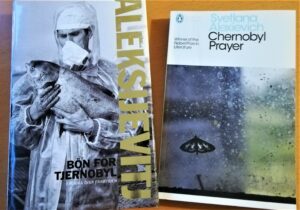
Anno 2015
Svetlana Alexievich in the town hall, beside the marshal, at the honorary dinner table. The flow of voices she brings forth, the testimonies and what they convey. How people suffered. And how those other than humans suffered; Chernobyl Prayer, ‘They were shrieking in their different languages.’1
What are they going to serve Svetlana Alexievich, what are they going to dine upon?
If Western history can be read gender critically, and power critically, it may also be read meat critically.
The exhibition of extinguished animal bodies was often a staging, a performance of power in a dire place; so how may a calf in bits appear appetizing in today’s situation of welfare and plethora of options?
Which is the tale preceding the act?
A material propaganda, from adults to children: partake in this hegemon, be complicit. As in this year’s Christmas calendar “To Christmas Eve in Thousand Years”: beaver bodies, wild boar bodies, calf heads, calf ears.
Now, eat, children.
But the people, the herds, the farmers may tell about the forefathers on the British Isles: ‘Animals were seldom killed for their meat. They were too valuable. Without your animals, you starved, and froze. Without your animals, you literally just died.’
During the eleventh century – and as a rule during many centuries – common people did not readily kill and eat their calves and goat kids since goats, sheep, and cows implied living warm bodies, leftover milk, wool to wear.
Bodies that could be exploited. The affluent in the fourteenth century did not, though this is asserted in the calendar, move from human slavery to goat trade; beside the trade in goats there was the exploitation of the majority.
How were people persuaded to become like their masters? How is it that people may believe themselves to be more human if they transform themselves into predators?
The culture of food was for long considered amoral, apolitical, given, and unproblematic. But plunder constitutes absolute emergency. Reflection stops, compassion is supplanted. To listen two-dimensional is the human possibility, the synchronizing of empathy with aforethought.
Pea soup is the oldest course we may still enjoy.
Same evening, different meeting. La révolution pacifique. La révolution pour le changement climatique. The peaceful revolution for a fossil free world. According to Chalmers University of Technology’s calculation of climate gasses, standard Swedish food culture emits eighteen hundred kilograms per person and year. Lactivore: twelve hundred kilograms.
Animal-free i.e. plant based: five hundred kilograms.
A food production which rather endeavours to incur less violence than makes violence a virtue. Food cultures which rather prolongs life than destroys it.
How is Svetlana Aleksijevitj message of peace received?
Between humans, but also between humans and those other than humans?
10th of December 2015
- Svetlana Alexievich, Chernobyl Prayer: A Chronicle of the Future, Penguin Modern Classics 2016, translated by Anna Gunin and Arch Tait. New translation of the revised edition published in 2013. In Swedish: Svetlana Aleksijevitj, Bön för Tjernobyl, krönika över framtiden, Utopins röster, översättning Hans Björkegren, Stockholm: Ersatz, (orig. 2005) 2013
- Svetlana Alexievich, Chernobyl Prayer: A Chronicle of the Future, p. 31.
© Arimneste Anima Museum #13